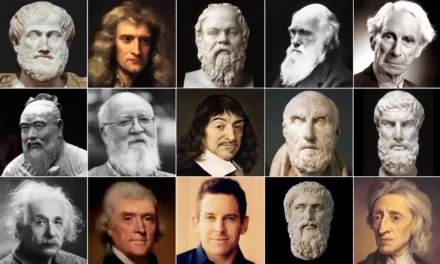
That’s what you believe, and you are probably wrong
How to tell opinions from facts
Y ou can’t just blindly believe everything you read or hear. It doesn’t matter who said it, or whether the place you read it in was written two weeks or two millennia ago. In our everyday lives we are bombarded with statements and claims of all sorts which potentially are—ultimately—just someone’s opinion. It is thus very important to be skeptical and have a clear understanding of the difference between fact and opinion. Mastering this skill is one of the keys to effective critical thinking, so you must become very attuned to whether the information you are hearing might be based on evidence or whether it’s just someone’s opinion. To be able to tell the difference you must first have a clear understanding of what each of these terms mean. The fundamental difference between facts and opinions is that facts are based on what is known, whereas opinions are based on what is believed.The fundamental difference between facts and opinion is that facts are based on what is known, whereas opinions are based on what is believed.
- Know for certain that it happened
- Know for certain it’s true
- Know for certain to exist
- Things believed to have happened
- Things believed to be true
- Things believed to exist
It’s very important we are able to tell when we are faced with an opinion masquerading as a fact, because otherwise we’ll alway be subject to being manipulated.

The safest route is to assume that what we are hearing is an opinion until and if we can verify if it’s a fact.
Tentative Truths
Unfortunately however, many times you are presented with opinions as if they were facts. This happens in our political discourse, in advertising, at school, at home, or at work. It is very pervasive, and if you are not equipped with the right detection tools, it can be very persuasive. But it does not necessarily mean the person presenting the information this way has nefarious intentions, although they may have. Either way, it’s very important you are able to tell when you are faced with an opinion masquerading as a fact, because otherwise you’ll alway be subject to being manipulated.
Until the claim can be verified, the most we can do is think of it as a tentative truth.
For example, review the following two assertions and determine whether they are fact or opinion:
- I believe the government has proof that JFK’s assassination was a conspiracy.
- The government has proof that JFK’s assassination was a conspiracy.
If you are like most people, you probably categorized the first one as an opinion and the second as a fact. After all, the first one was preceded by the qualifying phrase “I believe”, so that was a no-brainer. But if you did this, you would have been only partially correct.
Why? Well, look at the second assertion more closely. It is indeed presented as a fact, but is it?
How would you know? Unless you had access to secret government information there is no way to tell either way.
In this type of situation—which you need to be very aware of as it happens all the time—we need to reserve judgement until and if you get to see the actual proof. Until the claim can be verified, the most you can do is think of it as a tentative truth, which cannot be determined to be an opinion or a fact, yet.
There are cases in which you may accept claims as true even if neither can you prove them to be true, nor can you realistically expect some official truth to finally settle the issue. In cases like this you may decide to tentatively believe an assertion based on the credibility of the person making the claim. For example, if a doctor tells you that pursuing a certain diet will allow you to reach your desired weight goal you should be more confident on the validity of that diet than if you read exactly the same claim on some random website.

FACT OR OPINION? CAN YOU TELL?
You think you are good at telling facts from opinions? Maybe. But you can always benefit from practicing this critical skill further.
Enter your information to get our FREE practice exercises so you can enhance your ability to distinguish between fact and opinion!
The difference between fact and opinion is important because if they were the same, or carried the same weight, we would be unable to tell what’s real from what’s not.

Why does this difference between fact and opinion matter?
The difference between fact and opinion is important because if they were the same, or carried the same weight, we would be unable to tell what’s real from what’s not, we would be unable to know if some claim is valid or not, and generally we would not be able to tell if what people are telling us refers to something known to be true as opposed to what they believe to be true. Understanding this difference between fact and opinion is therefore key to making good decisions. Facts are generally considered to be of greater value and carry greater authority than opinions, as they should. Thus, it is very important to use and rely on facts in order to:- Assess the validity of arguments we read or hear
- Support our own arguments, and
- Make wise decisions
Example
If you go to a job interview and you tell the prospective employer that you would be the perfect candidate for them and support that assertion with facts, you would be more likely to get the job than if you had simply expressed the opinion, “I think I deserve to be hired because I’m perfect for the job.” Imagine that the prospective employer asks you why he should hire you, and you give him either of the following two answers. Try to discern from these instances which one carries more weight:- “I think I deserve the position because I have been working for a long time and have always done a good job, and I would really love to work here.”
- “I think I deserve the job because it requires four years of experience making widgets and successfully managing a production team of at least ten people, and I have a demonstrable track record of making millions of widgets for the last seven years and I managed a team of fifteen, all of whom would be happy to give good references.”
We should always rely on evidence and facts when making big decisions, and we should always be very careful not to let opinions and emotions influence our decisions.

FACT OR OPINION? CAN YOU TELL?
You think you are good at telling facts from opinions? Maybe. But you can always benefit from practicing this critical skill further.
Enter your information to get our FREE practice exercises so you can enhance your ability to distinguish between fact and opinion!







0 Comments